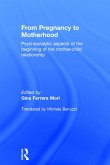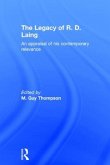The Business of Being Made is the first book to critically analyze assisted reproductive technologies (ARTs) from a transdisciplinary perspective integrating psychoanalytic and cultural theories. It is a ground-breaking collection exploring ARTs through diverse methods including interview research, clinical case studies, psychoanalytic based ethnography, and memoir. Gathering clinicians and researchers who specialize in this area, this book engages current research in psychoanalysis, sociology, anthropology, philosophy and debates in feminist, queer and cultural theory about affect, temporality, and bodies. With psychoanalysis as its fulcrum, The Business of Being Made explores the social constructions and personal experiences of ARTs. Katie Gentile frames the cultural context, exploring the ways ARTs have become a complex form of playing with time, attempting to manufacture a hopeful future in the midst of growing global uncertainty. The contributors then present a range of varied experiences related to ARTs, including: Interviews with women and men undergoing ARTs; A psychoanalytic memoir of male infertility; Clinical research and work with transgender, gay and lesbian patients creating new Oedipal constellations, the experiences of LBGTQ people within the medical system and the variety of families that emerge; Research on the experiences of egg donors (now central to the business of ARTs) and a corresponding clinical case study of successful egg donation; The experiences of ongoing failure which is the often unacknowledged for ART procedures; How and when people choose to stop using ARTs; A psychoanalytic ethnography of a neonatal intensive care unit populated in part with the babies created through these technologies and their parents, haggard and in shock after years of failed attempts.¿ Full of original material,¿The Business of Being Made¿ conveys the ambivalence of these technologies without simplifying their complicated consequences for the bodies of individuals, the family, cultures, and our planet.¿This book will be relevant to clinicians, medical and psychological personnel working in assisted reproductive technologies and infertility, as well as academics working in the fields of sociology, literature, queer and feminist theories and at the intersections of cultural, critical and psychoanalytic theories.
Hinweis: Dieser Artikel kann nur an eine deutsche Lieferadresse ausgeliefert werden.
Hinweis: Dieser Artikel kann nur an eine deutsche Lieferadresse ausgeliefert werden.








